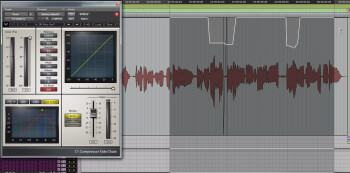The smartest among you might have realized, after reading the previous article, that most of the problems addressed with functional automation can be solved in other ways, which is something we'll look into today...
There is always an option
To illustrate what I mean, I’ll go back to last week’s examples. In the first case, the idea was to automate a filter on the low end of a folk guitar to make it sound more natural during parts when it’s played together with and without a bass. Another way to get the same result would be to use a dynamic EQ with an external sidechain. Indeed, by inserting the EQ on the guitar track and controlling the filter on the low end with the sidechain fed with the bass, you can get a similar result. But you need to pay special attention to the settings of the time constants and the EQ’s frequency range or you might end up with an ever more unnatural result.
In the second case I explained how to automate the threshold of a compressor, or the track’s volume pre-compressor, to make the compression more transparent during the highest peaks. An alternative solution consists in using a second compressor ahead of the one in place and dial it in so that it gently brings down the level of the problematic peaks to something more apt for the next compressor in the chain.
To close this paragraph I’ll just add that most functional automation cases can be solved in alternative ways if you get a bit creative.
Six of one and half a dozen of the other?
But then, is one way better than the other? Well, yes and no, it depends on your working habits, the situation and the tools at your disposal.
Personally, I’m a fan of the “less is more” philosophy so I tend to go for automation whenever I can, because it sounds more natural to my ear. Furthermore, you don’t always have the right plug-in for the issue at hand, like a dynamic EQ plug-in with an external sidechain, for instance. Not to mention that some of these tools are not exactly what I’d call easy to use: Never underestimate the mischief that using such complex tools can bring about if used improperly. In short, functional automation is the way to go, if you ask me.
However in my humble opinion, this solution might not be the best in certain situations. For example, in the example of the compressor used above, when the number of peaks is very high, it would take you a lifetime to try to solve the issue with automation. In this case, using a second compressor seems a more appropriate solution that can make your productivity skyrocket.
To wrap it up, and as usual during mixdown, there is no clear and single answer as to whether you should do things this or that way. You’ll have to decide on a case-by-case basis.
Next week we’ll address the second type of automation, which I call “artistic automation.”

